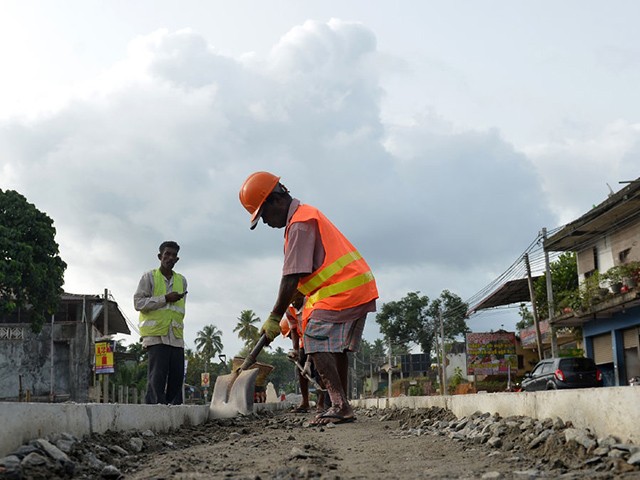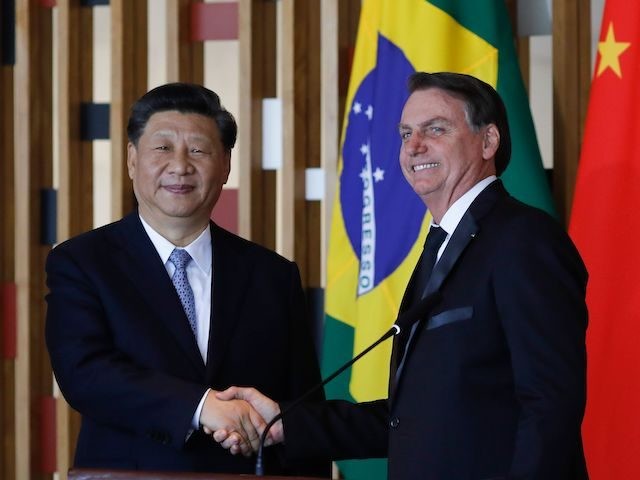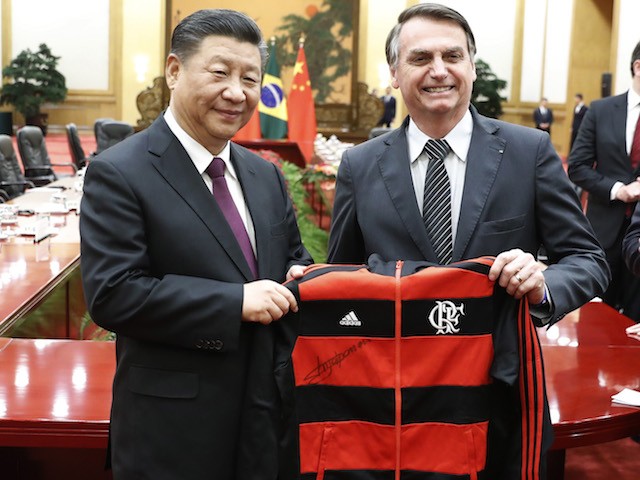Brazilian Ambassador to China Paulo Estivallet de Mesquita told the communist country’s Global Times propaganda newspaper in an interview published Thursday that self-proclaimed conservative President Jair Bolsonaro has a “great interest” in China’s Belt and Road Initiative (BRI).
The interview took place in the context of the currently ongoing BRICS virtual summit, bringing together the leaders of those two nations plus those of South Africa, Russia, and India. Brazil joined the BRICS economic alliance during the term of former Brazilian President Luiz Inácio da Silva, a hard-left socialist currently vying for the presidency against Bolsonaro despite being convicted of corruption and sentenced to over two decades in prison, a sentence the Brazilian Supreme Court later overturned. Bolsonaro, who once campaigned on a promise to become a champion of anti-communism and loudly questioned Lula’s policy of entangling Brazil’s economy with China’s, has entirely abandoned that stance, embracing business with China and at one point falsely calling China a “capitalist” country.
The BRI is a global plan in which China offers poor countries predatory loans on the promise that they can spend the money paying Chinese companies to build major roads, ports, railways, skyscrapers, and other infrastructure that would otherwise be prohibitively expensive for them. The projects almost universally do not meet the profit expectations the Chinese government sets prior to the agreements, and many countries then fall into spirals of being unable to pay their debts, resulting in the Chinese Communist Party seizing the assets involved. Among the most negatively affected countries in the BRI are Sri Lanka, Rwanda, Kenya, and Pakistan.

A Sri Lankan road construction labourer works along a road in Colombo on August 5, 2018. Sri Lanka’s central bank on August 3 announced it had secured a $1 billion Chinese loan as the island, a key link in Beijing’s ambitious Belt and Road Initiative, develops closer relations with Asia’s largest economy. (LAKRUWAN WANNIARACHCHI/AFP via Getty Images)
While China claims the intent of the BRI is to reconstruct the Ancient Silk Road trade route from Beijing to western Europe, it has aggressively campaigned to bring BRI projects into Latin America, which played no role in the pre-Columbian Silk Road trade.
Estivallet did not give the Global Times too much information on Bolsonaro’s alleged interest in the program, but did say that Brasilia would look into joining it.
“We view the Belt and Road Initiative with great interest,” the ambassador said. “During President Bolsonaro’s visit to China in 2019, our leaders agreed to look for synergies between the BRI and Brazil’s investment program. We already have many investment projects that fit these criteria.”
Estivallet emphasized that China is Brazil’s largest trade partner and that Brazil has a trade surplus with China. (By comparison, Brazil has a trade deficit with its second-largest partner, America.)
“Our trade with China in 2021 was more than twice as large as our trade with the US,” the ambassador noted, lauding the bilateral relationship.
“Brazil’s experience with Chinese investment in the last few years has been good, and it is my understanding that Chinese investors are also satisfied with the results and the prospects for their investments in Brazil,” Estivallet said. “Of course, it is important that Chinese companies continue to comply with all relevant laws and regulations, and each investment must be carefully considered on its own merits.”
Estivallet also praised Chinese-made coronavirus vaccines and claimed they “played a key role in the fight” against the disease in Brazil, a bizarre comment in light of Bolsonaro’s personal objection to experimental vaccine candidates and promotion of alternative treatments such as hydroxychloroquine, which studies have not proven effective in combatting the disease.
Bolsonaro was highly complimentary of China and its brutal dictator, Xi Jinping, during his address to the BRICS summit yesterday. China is officially hosting the summit despite the fact that it is being held “virtually,” meaning the leaders are addressing each other via video.
“I want to thank the Chinese presidency for organizing this encounter, greetings to President [sic] Xi Jinping and the Chinese people, who received me so well during my visit to China in 2019,” Bolsonaro said. “On that occasion, we advanced the strategic partnership between Brazil and China with concrete benefits for our people, as demonstrated in our cooperation during the [Chinese coronavirus] pandemic.”
Bolsonaro also urged the BRICS coalition to “increase efforts seeking the reform of international organizations like the World Bank, the IMF [International Monetary Fund], or the United Nations system, especially its Security Council.” Russia and China, two BRICS members, have permanent seats on the Security Council.
Bolsonaro spent much of 2020 vehemently opposing Chinese coronavirus vaccines and insisting he would not let Brazilians be used as “guinea pigs” for Chinese pharmaceutical companies. A year later, however, when the vaccines became available, he changed his tune and allowed them in the country, thanking the Communist Party profusely.
The abrupt change in attitude also marked his change from candidate to president regarding China policy. In 2018, while campaigning, Bolsonaro hinted that he would significantly limit Chinese investment in the country.
“China isn’t buying in Brazil. China is buying Brazil,” Bolsonaro told reporters that year. “Are you willing to leave Brazil in the hands of the Chinese?”
Bolsonaro was elected in October of that year and appeared to immediately adopt a different policy, inviting Chinese government officials to his inauguration and planning a visit to Beijing the next year. In China, Bolsonaro signed eight trade agreements with Xi and proclaimed, “Brazil needs China, and China needs Brazil.” As a gesture of friendship, Bolsonaro gifted Xi his favorite team’s soccer jersey.


COMMENTS
Please let us know if you're having issues with commenting.